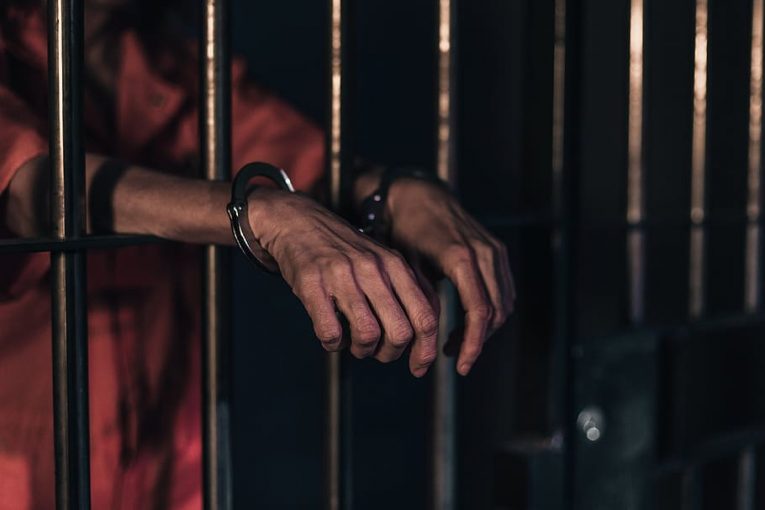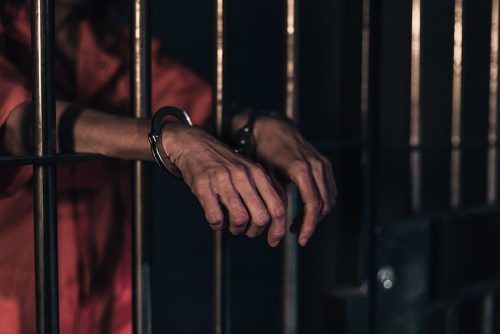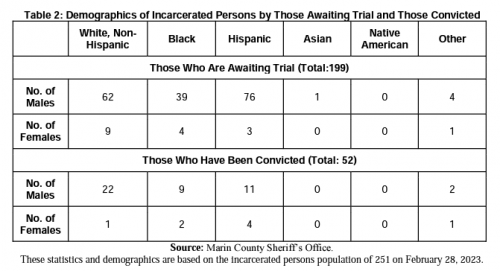

By Crescenzo Vellucci
The Vanguard Sacramento Bureau
SAN RAFAEL, CA – The Marin County Civil Grand Jury earlier this month slammed the Marin County District Attorney’s office as the main culprit responsible for thousands of criminal cases backlogged, including hundreds of them more than two years old, resulting in 79 percent of the people in the county jail only waiting for their trials, and not convicted of any crime.
The 2022-2023 Marin County Civil Grand Jury’s report, aptly named “Justice Delayed Is Justice Denied — Marin District Attorney’s Office in Crisis,” was direct, arguing “a substantial backlog of criminal cases pending in Marin County…affects the community at large, including victims of crime, people charged with crimes, and the law enforcement agencies responsible for investigating and prosecuting criminal cases.”
The GJ added, “Once charges are filed in Marin, there is an unreasonable delay in bringing these cases to a resolution—in many cases more than a year,” noting more than 40 percent of nearly 1,900 pending misdemeanor cases have been pending for more than a year and an outstanding 17.9 percent pending for more than two years.

Felony cases are slightly better, with just 12 percent of cases more than two years on hold, but 38 percent of 458 felony cases pending for more than a year.
The report notes the majority of people facing these long delays for justice are people of color, as are the people in jail awaiting—20 percent of them for more than a year—trial. Seventy-nine percent of the 251 people in county jail as of Feb. 28 were awaiting trial.

The grand jury investigation “concluded that the District Attorney’s Office is the primary reason for the delays in resolving criminal cases in Marin,” adding the DA’s Office “faces significant challenges,” including not enough prosecutors (more than a dozen have left in the past 14 months), and multiple lawsuits filed by current and former employees against the DA Office for discrimination based on race, gender and age, among other reasons.
Among the recommendations by the grand jury to alleviate the “substantial” backlog are, before the end of the year, the hiring of an “independent consultant” to analyze office operations, hiring “two or more” experienced short term attorneys to facilitate plea deals to reduce caseloads, and hiring additional attorneys to “maintain caseloads at manageable levels.”
The GJ also recommended the DA “implement a new process to provide discovery materials (e.g., police report, defendant’s criminal history, and camera footage) to defense counsel within a reasonable time of arraignment—which is not being done now, hire an “expediter” to negotiate pleas in misdemeanor cases, hire more paralegals and report back to the Board of Supervisors by Nov. 1 this year.
The grand jurors also strongly recommended a new jail policy for people awaiting trial, granting them “more accommodations than inmates who have been convicted. Possible accommodations include, where appropriate, contact visits with family, utilization of technology (e.g.,tablets) within their cells, and contact visits with defense counsel.”
The grand jury admitted the recent pandemic had a “significant impact on virtually all aspects of our community and daily life. The criminal justice system was no exception,” an acknowledged during “this period, it was understandably difficult to resolve cases.”
But while the courts in Marin opened in early 2021 for criminal cases, only one courtroom was reconfigured to address Covid issues. By the end of 2021, more courtrooms were in use.
However, the Marin Grand Jury wondered, if 90 percent of more of the criminal cases settled normally and the pandemic did not “stand in the way” of the DA’s Office negotiations, why, as of February of this year, “79
percent of people incarcerated in the Marin County Jail had not been convicted but were awaiting trial or disposition of their cases.”

“While the pandemic was certainly a factor in 2020 and 2021, it became apparent through the Grand Jury’s investigation that the District Attorney’s Office is currently the primary reason for the delays in resolving criminal cases,” the report alleged.
The grand jury, interviewing current and former prosecutors and defense attorneys, probation and law enforcement, said it collected “data on the criminal cases pending in Marin, the population in the county jail, and statistics from the District Attorney’s and the Public Defender’s Offices,” and “reviewed articles on pending lawsuits and government claims filed by current and former employees” of the DA Office.
The GJ argued the “right to a speedy trial is a fundamental right guaranteed by both the United States and California Constitutions. Penal Code section 1382 implements the speedy trial right. Section 1382 provides that an individual charged with a misdemeanor who is in custody must be brought to trial within 30 days of arraignment or entry of a plea (whichever is later), or within 45 days if out of custody. An individual charged with a felony must be brought to trial within 60 days of arraignment.”
But, the GJ, even acknowledging “[t]he right to a speedy trial is often waived by defendants, which allows cases to proceed beyond the statutory time periods in Section 1382,” maintained “prosecutors and defense attorneys agree that cases should be resolved in a reasonable period of time.”
Finally, the Marin GJ Report commented the “community at large is adversely affected by the failure to resolve cases in a timely manner.
“A community’s values are reflected in the need for the criminal justice system to resolve cases in a fair, consistent, and timely manner. The long delay in resolving cases in Marin affects the community at large, including the victims of crimes, people who are charged with crimes, and the law enforcement agencies that carry out the criminal investigations,” said the report.
The GJ added, “The impact of these delays is considerable. Victims of crimes live with the uncertainty of the outcome as cases drag on through the criminal justice process. For example, domestic violence and sexual assault cases present particularly delicate and challenging issues that unnecessary delays can aggravate. Victims become frustrated by the delays, witnesses’ memories fade with time, and cases become more difficult to prosecute.
“The impact on people charged with crimes is considerable. The dark shadow of the criminal charge affects their reputation in the community and may adversely impact their family life and employment. Witnesses may move and be unavailable many months, or years, after charges are filed, depriving defendants of testimony for their defense.”




